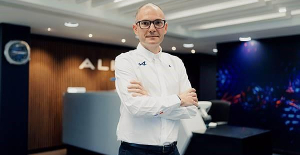It’s a question that has haunted religions and the arts for millennia. What should we think and do about this malevolent part that we carry in each of us? This “dark side” to which we can all potentially be drawn has been personified in the science fiction saga Star Wars by the iconic figure of Darth Vader. It is a shadow that the psychoanalyst Carl Jung said that we must dare to look at in order to be able to meet ourselves...
We could also define it as all the behaviors or aspects of our personality that deviate from common sense. It must be remembered that the notion is relative, since “the definition of what is good or bad varies according to culture. Homosexuality, for example, may have been considered a sin or a perversion at certain times, but totally accepted at others, during ancient Greece for example,” recalls Stéphane Rusinek, clinical psychologist and professor at the University of Lille. There is only a dark side in relation to social norms.
Certain acts are still considered bad in almost all societies and eras, such as murder or rape. But everyone can be affected by destructive ideas of this order. “If we could know all the thoughts of people, humanity would no longer exist. It would be simply unbearable, as our emotions are variable and inconsistent from one moment to the next,” says Éric Charles, psychiatrist at the Esquirol hospital center in Limoges. “In George Lucas's fiction there is this balance to be found between the light and dark side of the force. One does not exist without the other, like yin and yang. These two movements coexist in us”, supports the psychologist Jean-François Marmion, author of the book “Psychology according to Star Wars”.
Most of these destructive thoughts fortunately remain in the state of ideas. However, they can frighten and torment us. “I have repeatedly heard patients confide to me: ‘if others knew what I really think, they would not be able to love me, they would think that I am a bad person’,” reports Stéphane Rusinek. Cognitive restructuring work can help them take a step back and welcome these thoughts more calmly.
In fact, according to the psychologist, we all have a tendency, to varying degrees, to manipulate others in an attempt to obtain something – for example material goods, money, admiration or recognition. love. Likewise, we are regularly crossed by negative thoughts, by desires of violence towards others which are “natural and understandable in human beings. In fact, the two main personality tests, the NEO-Pi and the MMPI, contain questions like 'have you ever thought badly of someone?' or 'have you ever wanted to kill someone?'. If the individual has a result that is 'too' good, we will consider that he or she lied and that the test results are unreliable,” points out Stéphane Rusinek.
Irrational thoughts can arise fleetingly, for example the idea of crashing into the car opposite when you are behind the wheel. Some people suffer from impulse phobia, a phenomenon which affects 100,000 individuals in France. They are terrified of, for example, throwing an infant out of a window, shouting profanities in a place of worship, or killing someone with a kitchen knife. However, there is never any action. “Impulse phobia is treated by gradually exposing yourself to the object of fear. We will therefore invite the patient to grab a knife so that he can see that nothing is happening,” explains Stéphane Rusinek. It is therefore not a pathology unlike psychopathy which involves a danger to oneself or others.
Certain contexts such as fear or the influence of toxic products favor the expression of our “dark side”. In the case of addictions, the patient who gives in to the substance “finds himself invaded, no longer has the impression of being himself: we speak of depersonalization”, observes Éric Charles. The numerous scandals reported about celebrities finally remind us that a situation of power, in which no one gives us limits, can give the impression of being all-powerful and disinhibit the impulses, whether creative or destructive... even if it means reveal the worst aspect of ourselves.

 What is chloropicrin, the chemical agent that Washington accuses Moscow of using in Ukraine?
What is chloropicrin, the chemical agent that Washington accuses Moscow of using in Ukraine? Poland, big winner of European enlargement
Poland, big winner of European enlargement In Israel, step-by-step negotiations for a ceasefire in the Gaza Strip
In Israel, step-by-step negotiations for a ceasefire in the Gaza Strip BBVA ADRs fall almost 2% on Wall Street
BBVA ADRs fall almost 2% on Wall Street Sánchez cancels his agenda and considers resigning: "I need to stop and reflect"
Sánchez cancels his agenda and considers resigning: "I need to stop and reflect" The Federal Committee of the PSOE interrupts the event to take to the streets with the militants
The Federal Committee of the PSOE interrupts the event to take to the streets with the militants Repsol: "We want to lead generative AI to guarantee its benefits and avoid risks"
Repsol: "We want to lead generative AI to guarantee its benefits and avoid risks" Osteoarthritis: an innovation to improve its management
Osteoarthritis: an innovation to improve its management The yen jumps 3% then falls again, amid speculation of Japanese intervention
The yen jumps 3% then falls again, amid speculation of Japanese intervention A very busy Friday on the roads of Île-de-France before the Ascension Bridge
A very busy Friday on the roads of Île-de-France before the Ascension Bridge Fraud: the government is preparing new measures for the fall
Fraud: the government is preparing new measures for the fall Nike breaks the bank to keep the Blues jersey
Nike breaks the bank to keep the Blues jersey Madonna ends her world tour with a giant - and free - concert in Copacabana
Madonna ends her world tour with a giant - and free - concert in Copacabana Harry Potter: Daniel Radcliffe “really saddened” by his final breakup with J.K. Rowling
Harry Potter: Daniel Radcliffe “really saddened” by his final breakup with J.K. Rowling Leviathan, New York Trilogy... Five books by Paul Auster that you must have read
Leviathan, New York Trilogy... Five books by Paul Auster that you must have read Italy wins a decisive round against an American museum for the restitution of an ancient bronze
Italy wins a decisive round against an American museum for the restitution of an ancient bronze Omoda 7, another Chinese car that could be manufactured in Spain
Omoda 7, another Chinese car that could be manufactured in Spain BYD chooses CA Auto Bank as financial partner in Spain
BYD chooses CA Auto Bank as financial partner in Spain Tesla and Baidu sign key agreement to boost development of autonomous driving
Tesla and Baidu sign key agreement to boost development of autonomous driving Skoda Kodiaq 2024: a 'beast' plug-in hybrid SUV
Skoda Kodiaq 2024: a 'beast' plug-in hybrid SUV The home mortgage firm rises 3.8% in February and the average interest moderates to 3.33%
The home mortgage firm rises 3.8% in February and the average interest moderates to 3.33% This is how housing prices have changed in Spain in the last decade
This is how housing prices have changed in Spain in the last decade The home mortgage firm drops 10% in January and interest soars to 3.46%
The home mortgage firm drops 10% in January and interest soars to 3.46% The jewel of the Rocío de Nagüeles urbanization: a dream villa in Marbella
The jewel of the Rocío de Nagüeles urbanization: a dream villa in Marbella Europeans: a senior official on the National Rally list
Europeans: a senior official on the National Rally list Blockade of Sciences Po: the right denounces a “drift”, the government charges the rebels
Blockade of Sciences Po: the right denounces a “drift”, the government charges the rebels Even on a mission for NATO, the Charles-de-Gaulle remains under French control, Lecornu responds to Mélenchon
Even on a mission for NATO, the Charles-de-Gaulle remains under French control, Lecornu responds to Mélenchon “Deadly Europe”, “economic decline”, immigration… What to remember from Emmanuel Macron’s speech at the Sorbonne
“Deadly Europe”, “economic decline”, immigration… What to remember from Emmanuel Macron’s speech at the Sorbonne These French cities that will boycott the World Cup in Qatar
These French cities that will boycott the World Cup in Qatar Mercato: Verratti at Barça? A track studied
Mercato: Verratti at Barça? A track studied Rugby: after the defeat during the Six Nations, the Blues will meet the English in September for a test match
Rugby: after the defeat during the Six Nations, the Blues will meet the English in September for a test match Premier League: Liverpool unveils its new jersey for next season
Premier League: Liverpool unveils its new jersey for next season Formula 1: Alpine holds its new executive technical director
Formula 1: Alpine holds its new executive technical director


















